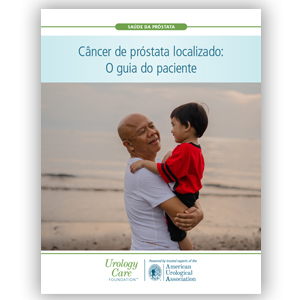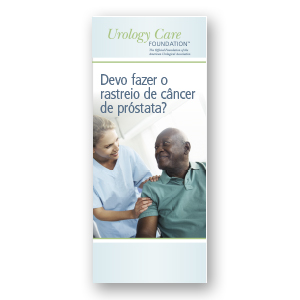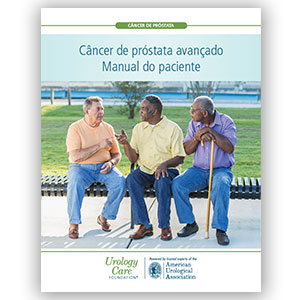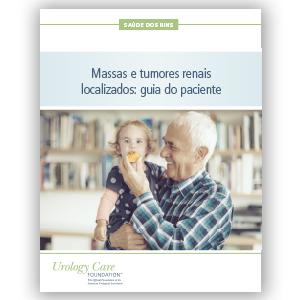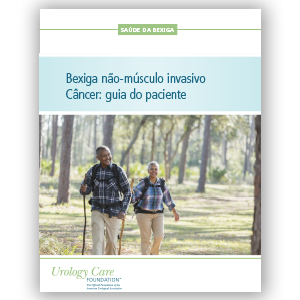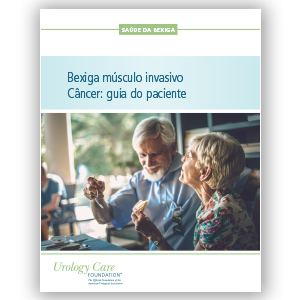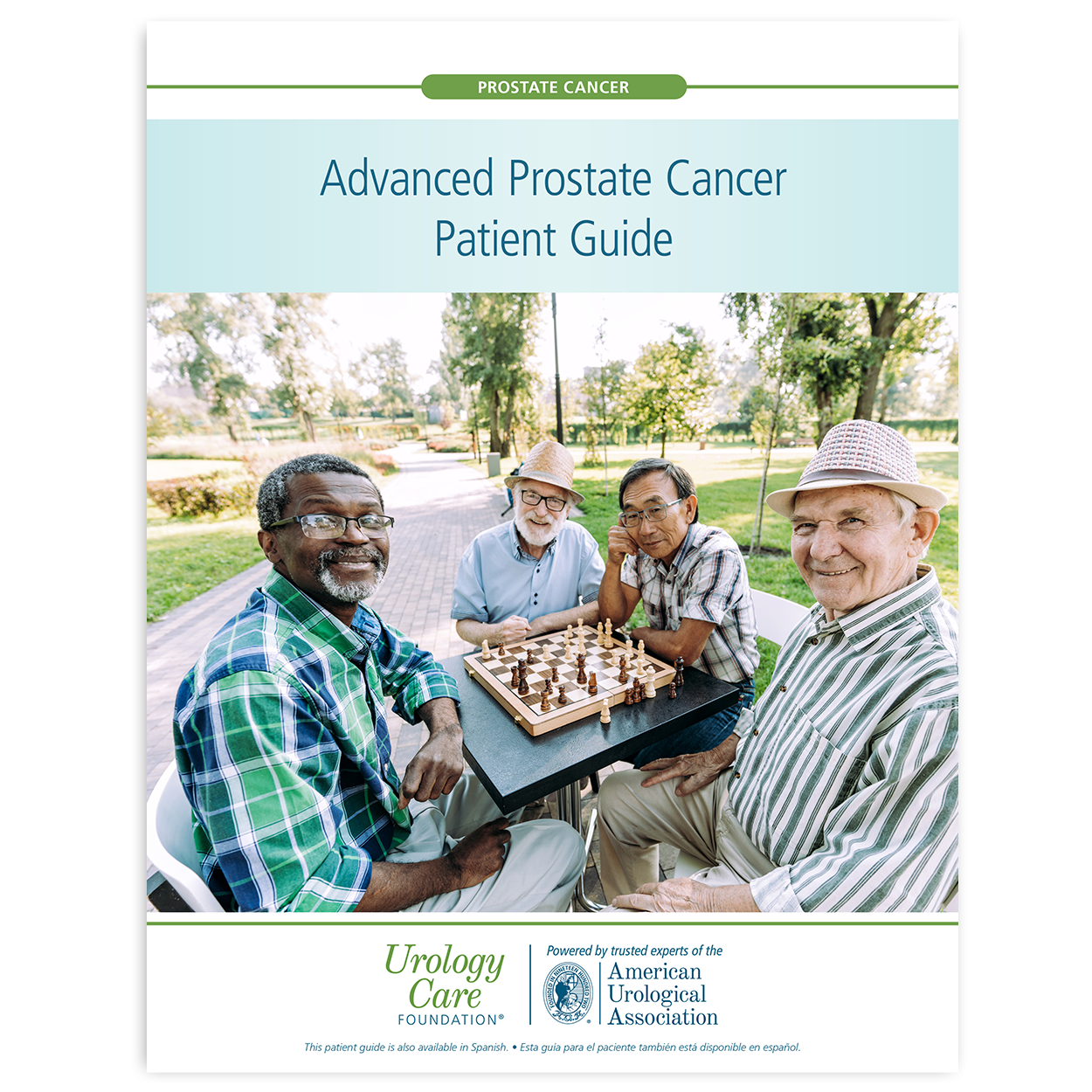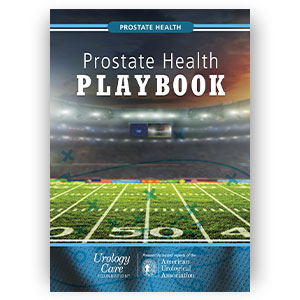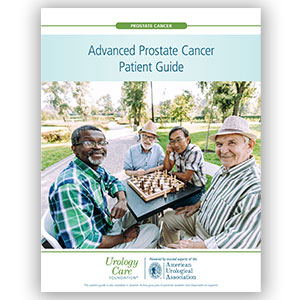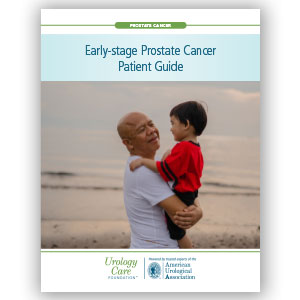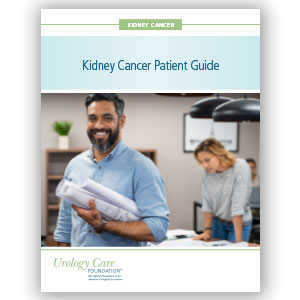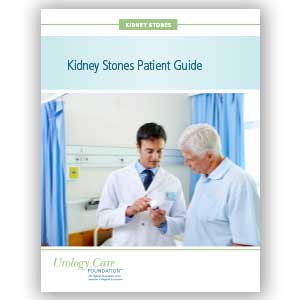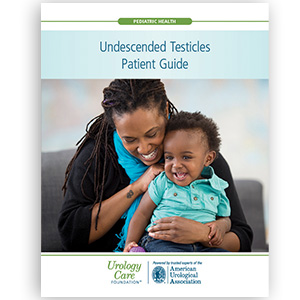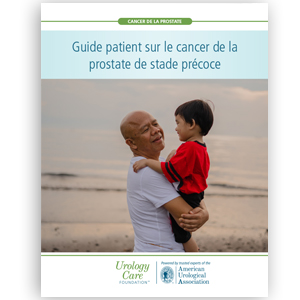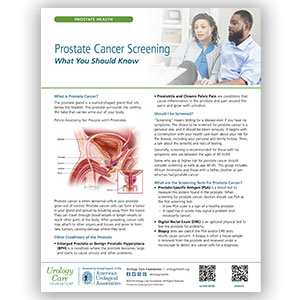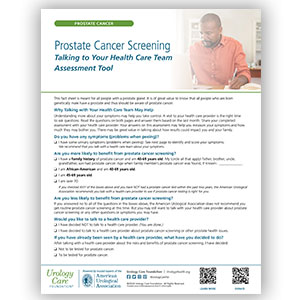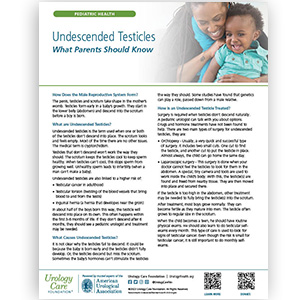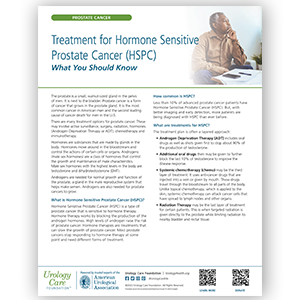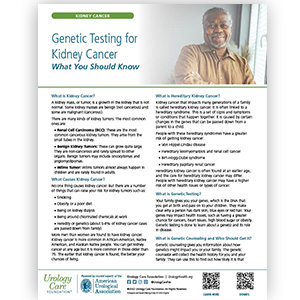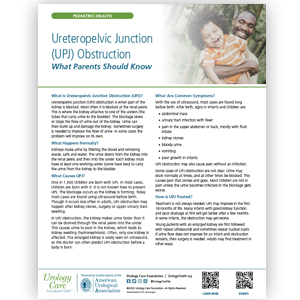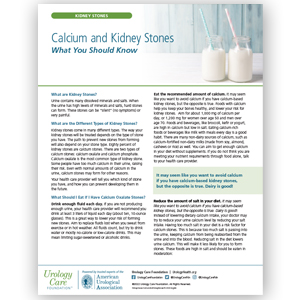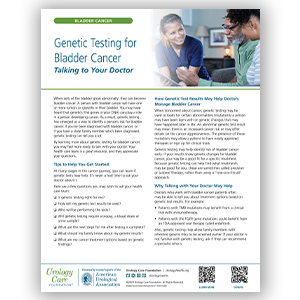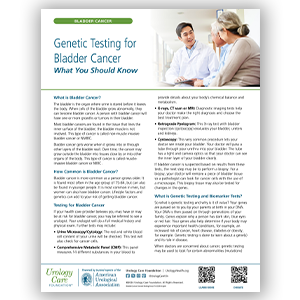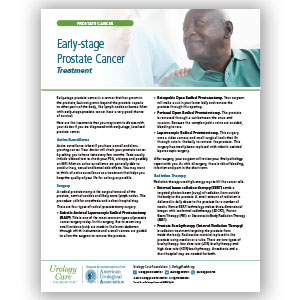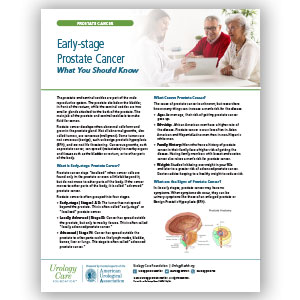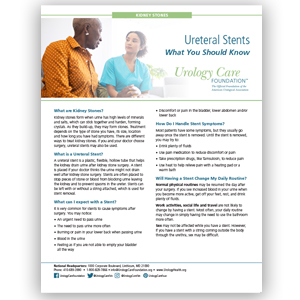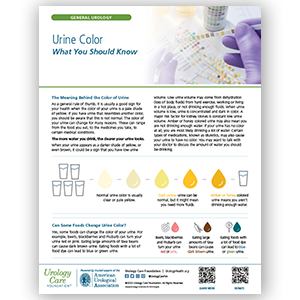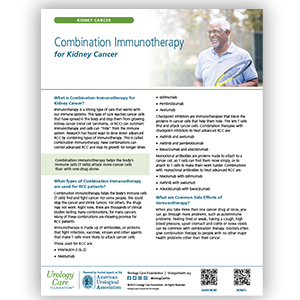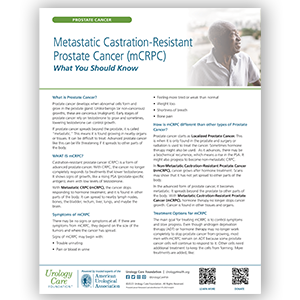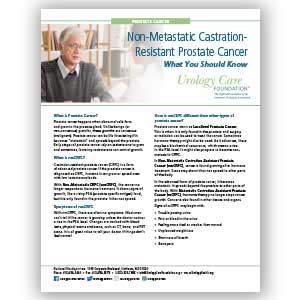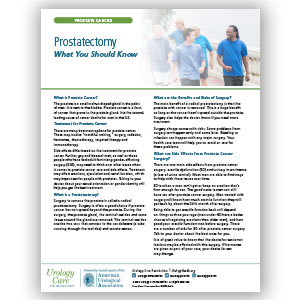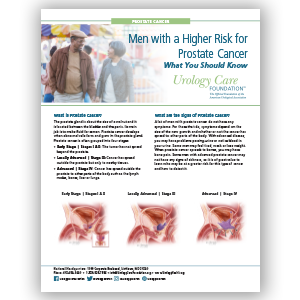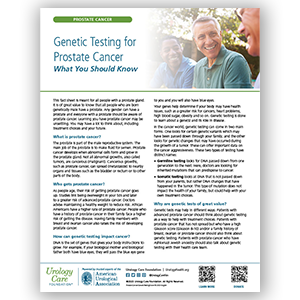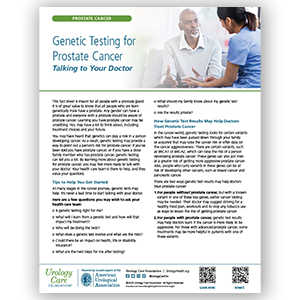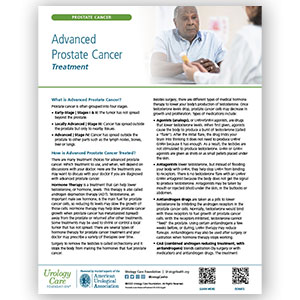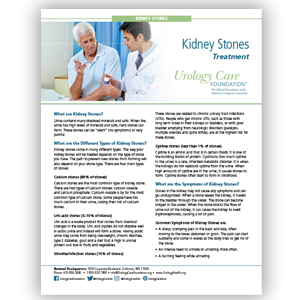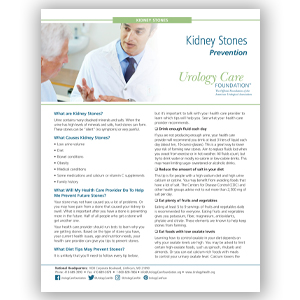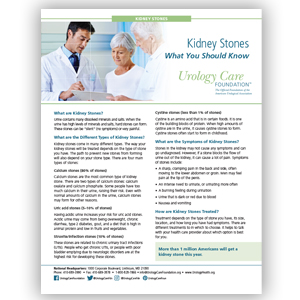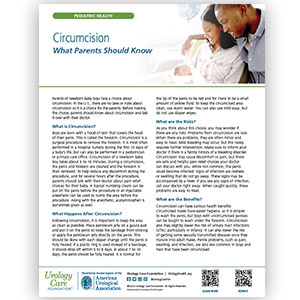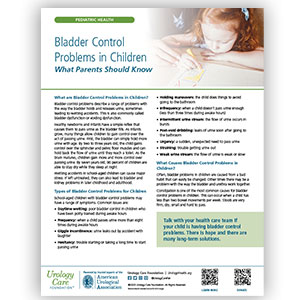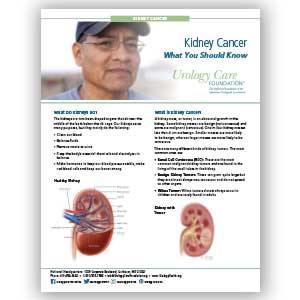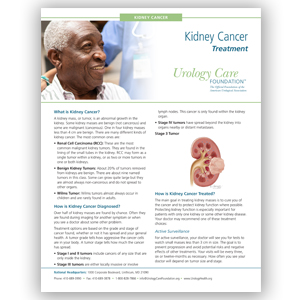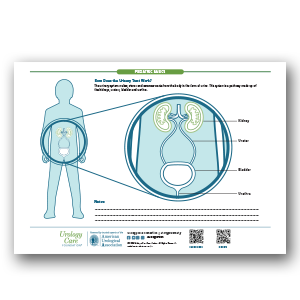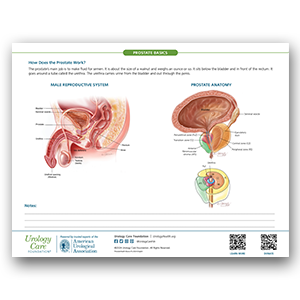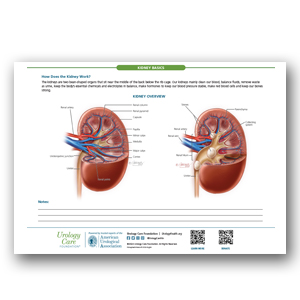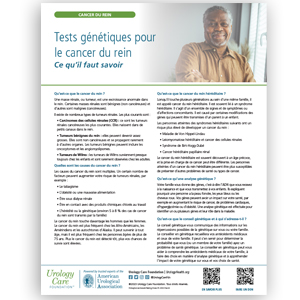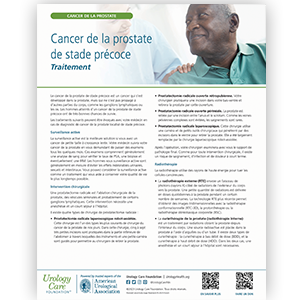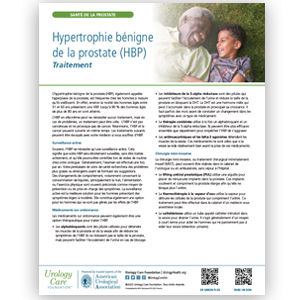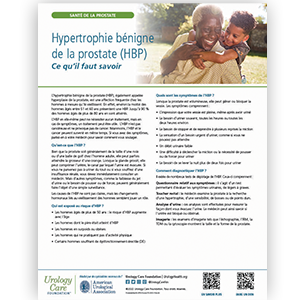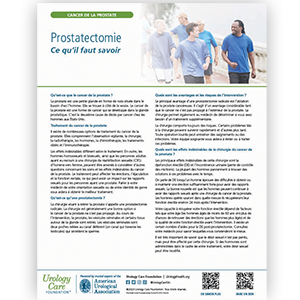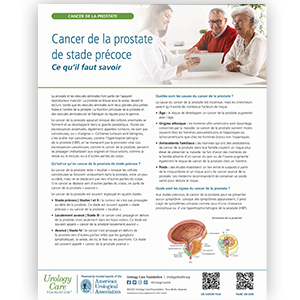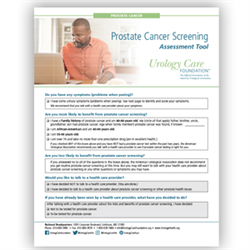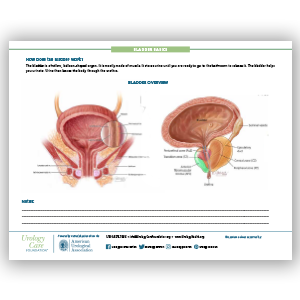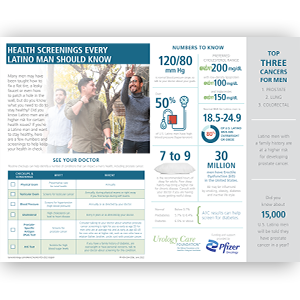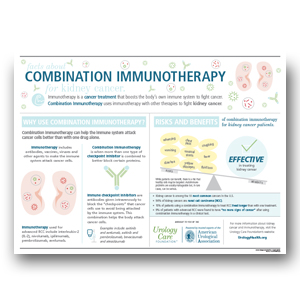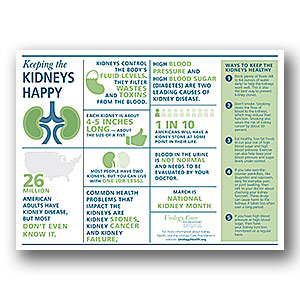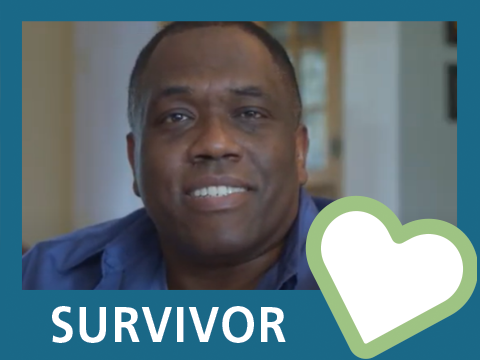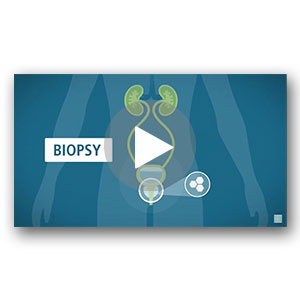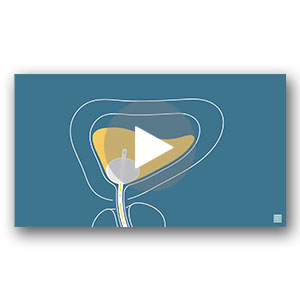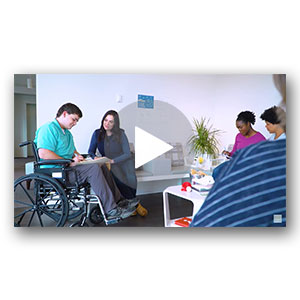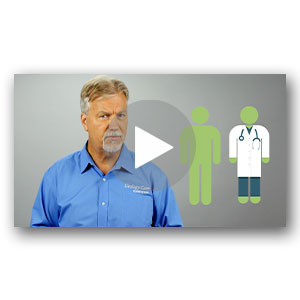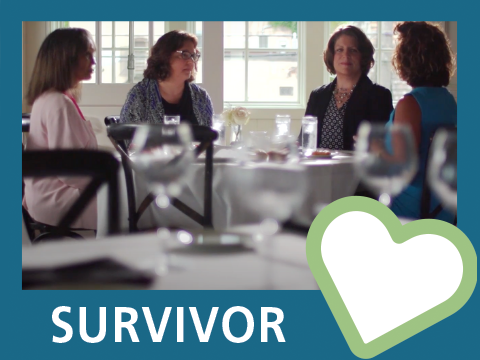Câncer de próstata localizado: guia do paciente
Como diagnosticar, fazer o exame preventivo, tratar e manejar o câncer de próstata localizado, incluindo a perspectiva de um paciente. (Early-stage Prostate Cancer Patient Guide)… more
Devo fazer o rastreio de câncer de próstata?
Um folheto de três dobras que revisa o câncer de próstata, seus riscos e as informações sobre o rastreio de câncer. (Is Prostate Cancer Screening Right for Me? Brochure)… more
Advanced Prostate Cancer
Order available (US ONLY). In this patient guide, patients are provided with information about advanced prostate cancer to help during their prostate cancer journey. Content includes how to diagnose, screen, treat and manage advanced prostate cancer, including a patient perspective.… more
Prostate Health Playbook
Order this football-themed prostate health resource covering prostatitis, BPH, incontinence as well as information on prostate cancer to include screening and treatment options.… more
Bladder Cancer Patient Guide
Guide with information about how to diagnose, treat and manage bladder cancer, including a patient perspective.… more
Living Healthy Cookbook with Information about Urologic Cancers
Part of managing cancer includes a healthy diet and lifestyle. This educational cookbook has recipes from celebrity chefs and is designed to help those affected by urologic cancers.… more
Living Healthy Cookbook with Information about Urologic Cancers
Part of managing cancer includes a healthy diet and lifestyle. This educational cookbook has recipes from celebrity chefs and is designed to help those affected by urologic cancers.… more
Living Healthy: Fight Kidney Stones with Food Cookbook
An educational recipe book designed to help prevent kidney stones with nutrition and diet.… more
Early-stage Prostate Cancer
How to diagnose, screen, treat and manage early-stage prostate cancer, including a patient perspective.… more
Guide patient sur le cancer de la prostate de stade précoce
Le cancer de la prostate est la deuxième cause de décès par cancer chez les hommes aux États-Unis. La plupart des hommes ayant un diagnostic précoce peuvent vivre longtemps. Choisir son traitement peut être difficile. Informez-vous et posez des questions afin de faire le choix qui vous conviendra le mieux. (Early-stage Prostate Cancer Patient Guide)… more
Hướng dẫn dành cho bệnh nhân ung thư bàng quang không xâm lấn cơ (UTBQ KXLC)
Ung thư bàng quang thường xuất phát từ lớp niêm mạc lót trong lòng bàng quang. (Non-Muscle Invasive Patient Guide)… more
HƯỚNG DẪN DÀNH CHO BỆNH NHÂN UNG THƯ BÀNG QUANG XÂM LẤN CƠ (UTBQ XLC)
Tài liệu hướng dẫn này sẽ nói cho bạn về UTBQ XLC và những gì bạn có thể làm để đối mặt với căn bệnh này. (Muscle Invasive Patient Guide)… more
Hướng dẫn dành cho bệnh nhân sỏi thận
Tài liệu này hướng dẫn cách chẩn đoán và điều trị sỏi, cũng như giải thích cách phòng ngừa bằng chế độ ăn uống vàthuốc. (Kidney Stones Patient Guide)… more
Hướng dẫn dành cho bệnh nhân ung thư thận
Hướng dẫn này sẽ cho bạn biết về ung thư thận và các bước tiếp theo mà bạn có thể thực hiện nếu một khối u hình thành trong cơ thể của bạn. (Kidney Cancer Patient Guide)… more
Hướng dẫn dành cho bệnh nhân ung thư tuyến tiền liệt giai đoạn tiến triển
Khi ung thư xâm lấn ra ngoài tuyến tiền liệt hoặc tái phát sau khi điều trị sẽ được gọi là ung thư tuyến tiền liệt giai đoạn tiến triển. Hiểu được bản chất của bệnh, làm sang tỏ các thắc mắc có thể giúp bạn đưa ra lựa chọn phù hợp. (Advanced Prostate Cancer Patient Guide)… more
Hướng dẫn cho bệnh nhân ung thư tuyến tiền liệt giai đoạn sớm
Ung thư tuyến tiền liệt phát triển khi các tế bào bất thường hình thành và phát triển trong tuyến tiền liệt. Hiểu được bản chất của bệnh, làm sang tỏ các thắc mắc có thể giúp bạn đưa ra lựa chọn phù hợp. (Early-stage Prostate Cancer Patient Guide)… more
UrologyHealth extra® – Bladder Cancer Special Issue
Order this special issue focusing on bladder cancer to be shipped free in the United States and includes information for patients and caregivers on the basics such as the stages of this cancer, symptoms, treatments, risk factors and how to learn more.… more
UrologyHealth extra® – Bladder Cancer Special Issue
Download this special issue focusing on bladder cancer that includes information for patients and caregivers on the basics such as the stages of this cancer, symptoms, treatments, risk factors and how to learn more.… more
UrologyHealth extra® – Navigating Prostate Cancer
Download this special issue focusing on prostate cancer that includes information for patients and caregivers on risk factors, healthy living tips and more.… more
UrologyHealth extra – Navigating Prostate Cancer
Order this special issue focusing on prostate cancer that includes information for patients and caregivers on risk factors, healthy living tips and more.… more
Prostate Cancer Screening What You Should Know
Order this patient-friendly prostate cancer screening fact sheet to be shipped free in the United States. This fact sheet is used to aid in decision making about prostate cancer screening.… more
Prostate Cancer Screening Talking to Your Health Care Team Assessment Tool
Download this free patient-friendly screening assessment tool designed to self-assess symptoms to help guide conversations with your health care team about prostate cancer screening. … more
Prostate Cancer Screening What You Should Know
Download this free patient-friendly fact sheet to aid in decision making about prostate cancer screening.… more
Treatment Intensification for Hormone Sensitive Prostate Cancer (HSPC) - Talking to Your Doctor Fact Sheet
Learn about treatment intensification for Hormone Sensitive Prostate Cancer and questions to ask your doctor.… more
Treatment for Hormone Sensitive Prostate Cancer (HSPC) - What You Should Know Fact Sheet
Learn about Hormone Sensitive Prostate Cancer, common treatments and what to expect after treatment.… more
Genetic Testing for Kidney Cancer – What You Should Know Fact Sheet
A description about genetic testing for kidney cancer and how genetic test results may help patients make informed choices.… more
Ureteropelvic Junction (UPJ) Obstruction - What Parents Should Know Fact Sheet
Learn about Ureteropelvic Junction (UPJ) Obstruction, its causes, symptoms and common treatments.… more
Androgen Deprivation Therapy (ADT) - Talking to Your Doctor Fact Sheet
Learn about how to talk to your doctor Androgen Deprivation Therapy (ADT) for prostate cancer.… more
Androgen Deprivation Therapy (ADT) – What You Should Know Fact Sheet
Learn about Androgen Deprivation Therapy (ADT) for prostate cancer, who should receive ADT, how is ADT given and the benefits, risks and side effects of ADT. … more
Calcium and Kidney Stones - What You Should Know Fact Sheet
There are two types of calcium stones: calcium oxalate and calcium phosphate. This fact sheet outlines what you should know about calcium and kidney stones.… more
Kidney Cysts - What You Should Know Fact Sheet
As a person ages, sacs filled with fluid, called cysts, can form in the kidneys. This fact sheet outlines what you should know about kidney cysts.… more
Bladder Exstrophy – What Parents Should Know Fact Sheet
Bladder exstrophy is a rare birth defect. On average, it occurs in about 1 out of every 50,000 live births. It is slightly more common in males than females. It is a condition where the bladder and parts around it form inside-out. … more
Bladder Cancer: What You Should Know
Learn more about the basics of bladder cancer including types, causes, symptoms, testing and treatment options. … more
Salvage Radiation Therapy for Prostate Cancer
Learn about salvage radiation therapy (SRT) as a type of cancer treatment given to men who had their prostate removed yet their prostate-specific antigen (PSA) levels begin to rise.… more
Genomic Diagnostic Testing for Prostate Cancer
Learn about genomic testing and how it may impact prostate cancer.… more
Advanced Prostate Cancer – What You Should Know
A review of advanced prostate cancer to include its stages and risk factors.… more
Genetic Testing for Bladder Cancer – Talking to Your Doctor
Learn more about genetic testing for bladder cancer and how to prepare as a way to feel more ready to talk with your doctor.… more
Genetic Testing for Bladder Cancer - What You Should Know
A description about genetic testing for bladder cancer and how genetic test results may help patients make informed choices.… more
Treatment for Early-Stage Prostate Cancer
This fact sheet covers the treatments you may want to discuss with your doctor if you are diagnosed with early-stage, localized prostate cancer.… more
Early-Stage Prostate Cancer: What You Should Know
Learn more about Early-Stage Prostate Cancer using this fact sheet.… more
Ureteral Stents What You Should Know
A ureteral stent is a plastic, flexible tube that helps the kidney drain urine after kidney stone surgery. Learn about how they feel, how they are removed and when to call a doctor if you feel concerned. … more
Urine Color - What You Should Know
A fact sheet about the meaning behind the color of urine for people of all ages to know when to drink more, what can change urine color and when to talk with a doctor about urine color.… more
Metastatic Hormone-Sensitive Prostate Cancer (mHSPC) - What You Should Know Fact Sheet
A concise summary about Metastatic Hormone-Sensitive Prostate Cancer to help patients understand this stage, to include treatment.… more
Combination Immunotherapy for Kidney Cancer Fact Sheet
Summary of combination immunotherapy for renal cell carcinoma including treatment, adverse reactions and questions to ask the health care team.… more
Hypospadias – What Parents Should Know
A short summary of Hypospadias, including signs, diagnosis, treatments and questions to ask your child’s doctor.… more
Varicoceles - What You Should Know
Designed for teen boys and men to explain this condition, causes, treatments and address frequently asked questions.… more
Metastatic Castration-Resistant Prostate Cancer (mCRPC) - What You Should Know Fact Sheet
A concise summary of Metastatic Castration –Resistant Prostate Cancer to help patients understand this stage of prostate cancer.… more
Bedwetting in Children: What Parents Should Know Fact Sheet
Download this fact sheet.… more
Non-Metastatic Castration-Resistant Prostate Cancer (nmCRPC) – What You Should Know
A concise summary of Non-metastatic Castration–Resistant Prostate Cancer to help patients understand this stage of prostate cancer.… more
Prostatectomy – What You Should Know Fact Sheet
A review of prostatectomy for prostate cancer treatment to include general information, benefits, risks and side effects. … more
Men with a Higher Risk for Prostate Cancer – What You Should Know
Learn about which men may have a higher risk for prostate cancer as well as about screening and treatment. … more
Genetic Testing for Prostate Cancer - What You Should Know
Learn about genetic testing and how it may impact prostate cancer.… more
Genetic Testing for Prostate Cancer – Talking to Your Doctor
At many stages in the cancer journey, genetic tests may help. This fact sheet may help prepare those impacted by prostate cancer to talk to the health care team.… more
Advanced Prostate Cancer Treatment
A review of advanced prostate cancer to include its stages and treatment options.… more
Pediatric Urology Basics
The basics about urinary function in children with notes section to help patients, parents and health care teams.… more
Prostate Basics
The basics about prostate function and prostate cancer with notes section to help patients and health care teams.… more
Kidney Basics
The basics about kidney function, kidney stones and kidney cancer with notes section to help patients and health care teams.… more
L’énurésie chez l’enfant: Ce que les parents doivent savoir
Il est question d’énurésie nocturne lorsqu’un enfant urine involontairement pendant son sommeil. C’est ce qu’on appelle communément faire pipi au lit. Plus de cinq millions d’enfants aux États-Unis ont des problèmes d’énurésie. (Bedwetting – What Parents Should Know Fact Sheet)… more
Tests génétiques pour le cancer du rein: Ce qu’il faut savoir
Une masse rénale, ou tumeur, est une excroissance anormale dans le rein. Certaines masses rénales sont bénignes (non cancéreuses) et d’autres sont malignes (cancéreuses). (Genetic Testing for Kidney Cancer - What You Should Know Fact Sheet)… more
Calcium et calculs rénaux: Ce qu’il faut savoir
L’urine contient de nombreux minéraux et sels dissous. Lorsque l’urine contient des niveaux élevés de minéraux et de sels, des cristaux solides appelés calculs peuvent se former. Ces calculs peuvent être « silencieux » (asymptomatiques) ou très douloureux. (Calcium and Kidney Stones – What You Should Know Fact Sheet)… more
Kystes rénaux: Ce qu’il faut savoir
Avec l’âge, des poches remplies de liquide, appelées kystes, peuvent se former dans les reins. Il existe cinq catégories de kystes rénaux. La plupart sont de classe I (kystes simples) et de classe II (kystes peu complexes). Ces types de kystes sont presque toujours non cancéreux. Les kystes complexes peuvent être associés à un cancer et devront être suivis ou traités. (Kidney Cysts – What You Should Know Fact Sheet)… more
Varicocèles: Ce qu’il faut savoir
Le terme varicocèle désigne une dilatation du groupe de veines situées à l’intérieur du scrotum (le sac qui contient les testicules) en raison d’une mauvaise circulation sanguine. (Varicoceles – What You Should Know Fact Sheet)… more
Cancer de la prostate de stade précoce: Traitement
Les traitements suivants peuvent être évoqués avec votre médecin en cas de diagnostic de cancer de la prostate localisé de stade précoce. (Early-stage Prostate Cancer Treatment Fact Sheet)… more
Hypertrophie bénigne de la prostate (HBP): Traitement
L’HBP en elle-même peut ne nécessiter aucun traitement, mais en cas de problèmes, un traitement peut être utile. L’HBP n’est pas cancéreuse et ne provoque pas de cancer. Néanmoins, l’HBP et le cancer peuvent survenir en même temps. Les traitements suivants peuvent être évoqués avec votre médecin si vous souffrez d’HBP. (BPH Treatment Fact Sheet)… more
Hypertrophie bénigne de la prostate (HBP): Ce qu’il faut savoir
L’hypertrophie bénigne de la prostate (HBP), également appelée hyperplasie de la prostate, est une affection fréquente chez les hommes à mesure qu’ils vieillissent. (BPH - What You Should Know Fact Sheet)… more
Prostatectomie: Ce qu’il faut savoir
La chirurgie visant à retirer la prostate s’appelle une prostatectomie radicale. La chirurgie est généralement une bonne option si le cancer de la prostate ne s’est pas propagé. (Prostatectomy - What You Should Know Fact Sheet)… more
Cancer de la prostate de stade précoce: Ce qu’il faut savoir
Le cancer de la prostate apparait lorsque des cellules anormales se forment et se développent dans la glande prostatique. Toutes les excroissances anormales, également appelées tumeurs, ne sont pas cancéreuses, ou « malignes ». Certaines tumeurs sont bénignes, c’est-à-dire non cancéreuses, comme l’hypertrophie bénigne de la prostate (HBP), et ne menacent pas le pronostic vital. (Early-stage Prostate Cancer - What You Should Know Fact Sheet)… more
Prostate Cancer Screening Assessment Tool
Order this patient-friendly screening assessment tool to be shipped free in the United States; designed to self-assess symptoms to help guide conversations with your health care team about prostate cancer screening. … more
Bladder Basics
The basics about bladder function and bladder cancer with notes section to help patients and health care teams. … more
Health Screenings Every Latino Man Should Know Poster
Did you know Latino men are at higher risk for many health issues? This free download includes numbers and screenings to help Latino men keep their health in check.… more
Combination Immunotherapy for Kidney Cancer
A graphic description of combination immunotherapy for renal cell carcinoma to include risks and benefits.… more
Bladder Cancer: Get the Facts
Did you know bladder cancer is the 10th most common cancer in the world? This patient education video from the Urology Care Foundation will tell you all of the facts you need about bladder cancer. … more
Genetic Testing for Bladder Cancer
You may have heard that genetics can play a role in a person developing cancer. As a result, genetic testing has emerged as a new way to identify a person’s risk for bladder cancer.… more
Bladder Cancer Treatment Series: Bladder Preservation
If you are a patient with muscle invasive bladder cancer, it is important to know your treatment choices. As part of your treatment, you may need to have some of your bladder removed. If this is the case, you should know your options for bladder preservation therapy.… more
Bladder Cancer Treatment: Intravesical Therapy
If you are a patient with non-muscle invasive bladder cancer, it is important to know your choices for treatment. Based on your diagnosis, your urologist may suggest intravesical therapy.… more
Bladder Cancer Treatment Series: Bladder Removal Surgery
Being told you have muscle-invasive bladder cancer can be very scary. However, your doctor and medical team are there to help. Your treatment choices will depend on how much your cancer has grown, and can involve bladder removal with chemotherapy or without chemotherapy.… more
Bladder Cancer Treatment Series: Urinary Diversion
If you are a patient with bladder cancer, it is important to know your choices for treatment.… more
Genetic Testing for Prostate Cancer
In this patient education video from the Urology Care Foundation, we discuss the basics of genetic testing for prostate cancer.… more
Ureteral Stents: What You Need to Know
If you have a kidney stone, treatment options vary. If you and your doctor choose surgery as treatment for your stone, a ureteral stent may be used.… more
Survivors: Patients & Caregivers Talk About Prostate Cancer
Survivors as patients and caregivers talk about their journey and how education can help take away from the fears that come with cancer.… more


